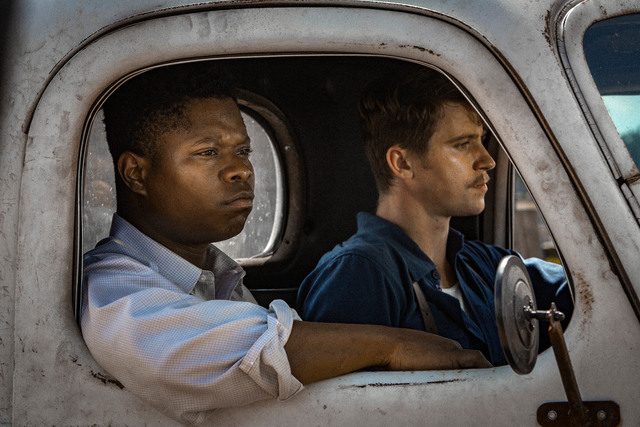Film Church: A look at highlights of Sundance 2017

PARK CITY, Utah — Even at Sundance, amid the revelry, the open bars and the very, very late nights, Sunday is reserved for church.
Granted, it’s Film Church, a humorous recap of the previous 10 days led by festival director John Cooper and director of programming Trevor Groth, but still.
From the cyberattack that temporarily shut down the festival’s ticketing system and Wi-Fi to what they referred to as Snowmageddon — “That is the most snow in my 28 years,” Cooper said, “the most consistent snow that we’ve had.” — both men agreed this was a Sundance for the ages.
“It stands out,” Groth, the former CineVegas programmer, told me later. “It felt different. … It’s certainly the most memorable. And I think it’s my most favorite, too, though, because of the importance of what these films are trying to do. We’ve never had a political climate like we have right now, so I think the artists’ voices are more important than ever because of that.”
Groth said his favorite moment of the festival was one that had no official ties to Sundance: the Women’s March on Main.
“What I loved most about it was just, the festival has always been about bringing people together and creating a community, and that moment, having 8,000 people on Main Street, really just accentuated and heightened that notion. It also connected us to the different cities across the U.S. It’s not just this isolated, elitist festival bubble. It was the same emotions and the same message everyone was sharing.”
Among my highlights:
— The 25th anniversary screening of the Sundance breakout “Reservoir Dogs,” presented via a brand new 35mm print, that was followed by an extended Q&A with writer-director Quentin Tarantino, producer Lawrence Bender and Mr. Blonde himself, Michael Madsen. Looking back at the 99-minute film, Tarantino told the adoring crowd, “I can’t believe I made a movie that short!” It was the closest thing to sheer bliss I’ve experienced inside a theater.
— The multiple points of view of “Mudbound,” a sprawling, World War II-era epic about a white couple (Jason Clarke, Carey Mulligan) who buy a Mississippi farm out from under the black family (led by Rob Morgan and Mary J. Blige) who’ve been working the land for years — and their family members (Garrett Hedlund, Jason Mitchell) who form an unlikely and dangerous bond over their shared experiences in the war.
— The inspirational “STEP,” a documentary about the dance team made up of the founding class of the Baltimore Leadership School for Young Women, a charter school that takes underprivileged girls — some don’t have food in their refrigerators; some don’t even have refrigerators — and places each of them into colleges.
— The lovable bizarreness of “Brigsby Bear,” about a young man (“Saturday Night Live’s” Kyle Mooney), kidnapped as a baby and raised in an underground bunker, whose only entertainment for 25 years was “Brigsby Bear,” a goofy educational series secretly produced by his “father” (Mark Hamill) that taught him everything from advanced mathematics to human sexuality.
— The gut-wrenching despair of the documentary “Last Men in Aleppo,” as the volunteer members of the Syrian Civil Defense try to save lives while they, along with their friends and neighbors who fled their war-torn homeland, are demonized. “The whole world is against us,” one of them realizes in a moment of clarity and hopelessness.
— The soundtrack to “Band Aid,” in which a married couple (Adam Pally, writer-director Zoe Lister-Jones) express their deepest, longest-lasting arguments through this song by forming a garage band with their creepy, sex-addict neighbor (Fred Armisen) on drums.
— The range of “Ingrid Goes West” co-stars Aubrey Plaza and Elizabeth Olsen, who did a complete 180 for their other films here, “The Little Hours” and “Wind River,” respectively.
— The moral conflict of “The New Radical.” Featuring interviews with Julian Assange, the documentary focuses on Cody Wilson, the inventor of the 3-D printed gun, and Amir Taaki, one of the minds behind Bitcoin, who come together to launch Dark Wallet as a way to anonymously send money to anyone, anywhere. (Full disclosure: the film is edited by Alex Lee Moyer, daughter of Review-Journal Editor-in-Chief J. Keith Moyer).
— And, speaking of Las Vegas, I was lucky enough to see an impromptu presentation of “Heartcorps: Riders of the Storyboard,” a “digital light poem,” in which one-time Cirque du Soleil performers bring hand-drawn images to life and interact with them via projection-mapping technology. One of the lead artists, known as Dandypunk, said Zappos founder Tony Hsieh donated the rehearsal space for the piece, and the plan is to have a permanent, six-room, immersive walk-through experience in downtown Las Vegas that will feel like traveling through a giant storybook.
Contact Christopher Lawrence at clawrence@reviewjournal.com. On Twitter: @life_onthecouch.